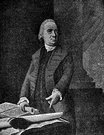Samuel Adams: Ringleader of the American Revolution
The name that comes to mind for most people who talk about the American Revolution is Samuel Adams. Described as a firebrand, a revolutionary, and a patriot, the young Adams was perhaps the most vocal of his generation to demand independence from Great Britain. He believed in the higher cause of independence, and he didn't often let laws that he thought unjust stand in his way. Born in Quincy, Mass., in 1722, in the same neighborhood that produced his cousin, the future President John Adams, and John Hancock, who bankrolled much of the Revolution, Samuel Adams grew up in a family that was respected and privileged. After an unremarkable childhood, he went to Harvard University and then to law school. Not finding it to his liking (or to his mother's liking), Samuel turned to business. He wasn't much good at that either and managed to lose all the money his father had given him.
"If our trade may be taxed, why not our lands? Why not the produce of our lands, and every thing we possess, or use? This we conceive annihilates our charter rights to govern and tax ourselves." Adams gained much fame for his actions and for this statement. He was soon at the center of the patriotic movement, the drive for America to have its own representation in the British government, the drive to avoid "taxation without representation," and what became the drive for independence. He also formed what came to be called the Country Party, which included farmers who supported his ideas. He was also, during this time, a founder and major player in the activities of the Sons of Liberty, a secret organization designed to foster the cause of independence. It was this group that participated in the Boston Tea Party. Next page > Voice of Independence > Page 1, 2 |
|
Social Studies for Kids
copyright 2002–2024
David White

 Now that he was free of his parents' obligations, he turned to the thing that he really loved: politics. He proved quite good at it, too, especially at making speeches and working long hours in the name of the causes he believed in. He published articles in newspapers. He wrote broadsheets with his views. He led meetings in taverns and houses, all demanding the right for Americans to govern themselves. When the British government announced in 1763 that it would begin to tax America's trade, the response was swift and defiant, with a statement written by Samuel Adams. It said, in part,
Now that he was free of his parents' obligations, he turned to the thing that he really loved: politics. He proved quite good at it, too, especially at making speeches and working long hours in the name of the causes he believed in. He published articles in newspapers. He wrote broadsheets with his views. He led meetings in taverns and houses, all demanding the right for Americans to govern themselves. When the British government announced in 1763 that it would begin to tax America's trade, the response was swift and defiant, with a statement written by Samuel Adams. It said, in part, 
